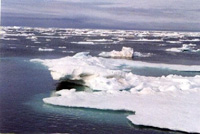
| Dramatic Losses of Sea Ice Continue | 23 October 08 |
 With new 2008 data, scientists are re-evaluating how much longer Arctic sea ice will survive warming summers. The U.S. National Ice and Snow Data Center confirms that 2008 Arctic ice retreat was the second worst on record, after 2007. With new 2008 data, scientists are re-evaluating how much longer Arctic sea ice will survive warming summers. The U.S. National Ice and Snow Data Center confirms that 2008 Arctic ice retreat was the second worst on record, after 2007.Greenhouse gas emissions raise atmospheric temperatures, causing Arctic ice to melt at an alarming rate. There has been a thirty-year downward trend in Arctic ice extent and the 2008 September low was 34% less ice than the long-term average from 1979 to 2000. "The Arctic is a bellwether for change that is coming globally and is coming much faster than any of the models suggested it should," said David Barber, an ice specialist at the University of Manitoba. Sea ice has a natural cooling effect as solar energy is reflected off its white surface. Ice loss increases energy absorption by dark ocean waters, altering the jet stream and global circulation patterns. Visit US National Snow and Ice Data CentreView October 2, 2008 National Snow and Ice Data Centre release View October 2, 2008 Ottawa Citizen article View October 2, 2008 Edmonton Journal article View September 17, 2008 National Geographic News article View September 29, 2008 National Geographic News article Sources: National Snow and Ice Data Centre, Ontario Citizen, Edmonton Journal, National Geographic News |
|
 Print version Print version |
Top |
